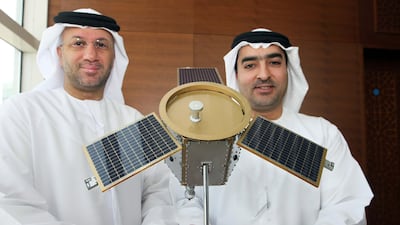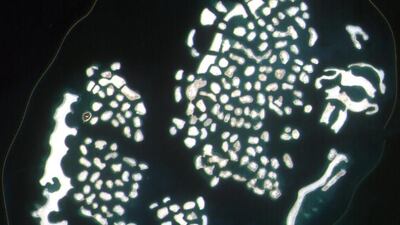The UAE has announced plans to launch the region’s biggest and most powerful satellite, MBZ-Sat, on a SpaceX Falcon 9 rocket in 2023.
MBZ-Sat, named after Sheikh Mohamed bin Zayed, Crown Prince of Abu Dhabi and Deputy Supreme Commander of the Armed Forces, will be three times more efficient than KhalifaSat — the first UAE-built satellite — which launched in 2018.
The project's aim was to have access to a strong Earth-observation satellite in space, but also to build it in partnership with locally based private companies to create economic impact.
Weighing about 700 kilograms, MBZ-Sat will launch on a rideshare mission on a Falcon 9 rocket. The space centre said it received “a competitive price” from the launch provider.
“In the last years the UAE has had so many achievements in space, one was the localisation of space projects,” Amer Al Sayegh, the Mohammed bin Rashid Space Centre’s senior director of space engineering, said at the International Astronautical Congress in Dubai on Wednesday.
“We’re looking at making the UAE a leading country in space systems. MBZ-Sat will be the most advanced satellite to be developed around the world, and in the Arab world.
“Partnering with local companies will help create jobs in the UAE, create newer and more advanced technology and benefit the economy in many different ways.”
The Mohammed bin Rashid Space Centre is working with five private companies in the UAE to manufacture the satellite, including aerospace manufacturing company Strata, engineering solutions company EPI, Rockford Xellerix, Halcon and Falcon Group.
Mr Sayegh said the satellite will have “the UAE’s biggest telescope”, with an advanced high-resolution camera that will take images from 500 kilometres above Earth’s surface.
There is an advanced electrical propulsion system, which uses ionised particles for accurate movement of the satellite in space.
The centre has teamed up with ground networks to offer 24-hour coverage, meaning images can be downloaded at any time or any place even if the satellite is not over the coverage area.
The first UAE Earth-observation satellites were DubaiSat-1 and then DubaiSat-2, both of which were built by Emiratis and South Koreans.
KhalifaSat was the first Emirati-built satellite, but development of MBZ-Sat focused on the partnership with private companies.
These Earth-observation satellites have been providing images to federal government departments and international customers for several years.
With MBZ-Sat, the space centre hopes to improve image quality and download speed to supply content more efficiently to customers.






